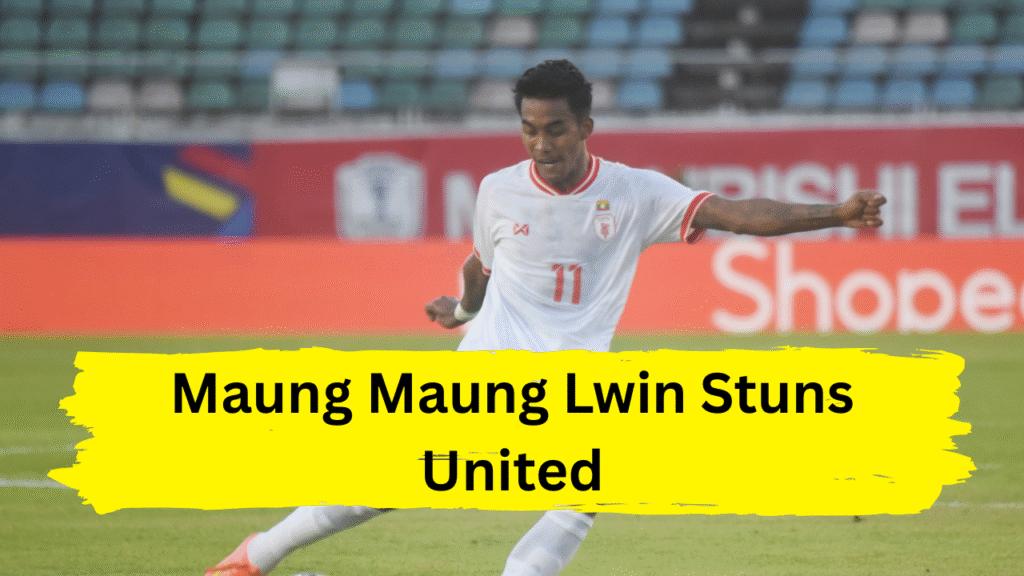The roar that erupted from 80,000 throats in Kuala Lumpur’s Bukit Jalil Stadium wasn’t just for a goal; it was the sound of a continent finding its voice through the boot of a relatively unknown warrior. When the net rippled in the 71st minute against the global behemoth Manchester United, the name echoing across Southeast Asia belonged not to a global superstar, but to Maung Maung Lwin, the unassuming captain of Myanmar. His precise, ice-cool finish didn’t just secure a historic 1-0 victory for the ASEAN All-Stars; it buried the fading pride of a fallen giant and illuminated the profound, often overlooked, depth of talent coursing through the veins of Southeast Asian football.
From Yangon’s Pitches to Humiliating Giants: The Journey of a Quiet Leader
To the wider football world before May 28, 2025, Maung Maung Lwin was likely a footnote. His career, etched primarily in the domestic leagues of Myanmar and neighbouring Thailand, lacked the dazzling European pedigree associated with conquering clubs like United. Yet, those familiar with ASEAN football knew his worth. As captain of the Myanmar national team, Lwin embodies a quiet resilience and lethal efficiency rather than flamboyant flair. He is the spearhead, the focal point, the player relied upon to convert the rare, precious chances that come Myanmar’s way in tough continental battles.
His club journey, primarily with Yangon United and stints in Thailand, speaks of consistency and a goalscorer’s instinct honed in competitive, if less globally visible, environments. He isn’t the player plastered on billboards, but the one managers trust to deliver when it matters most. This understated profile made his decisive moment against United all the more poetic. It wasn’t luck; it was the culmination of years spent perfecting his craft in the crucible of Southeast Asian competition, waiting for the platform to prove his quality on an unimaginable scale.
The Moment That Defined a Career and a Region
The goal itself was a masterpiece of composure under the brightest lights imaginable. Patrick Segecic’s perfectly weighted flick sent him clear, one-on-one with United’s Turkish international goalkeeper, Altay Bayindir. The weight of expectation – not just of the roaring crowd, but of an entire region yearning for recognition – rested on his shoulders. The easy narrative would have been a snatched shot, a moment of overwhelmed nerves. But Lwin, demonstrating the calmness of a seasoned veteran, took a single, steadying touch. He assessed Bayindir’s advance, picked his spot low and hard across the keeper, and delivered a finish of surgical precision into the far corner. It was the action of a natural predator, a striker utterly convinced of his ability, regardless of the legendary red shirt bearing down on him. In that instant, Maung Maung Lwin ceased being just Myanmar’s captain; he became ASEAN’s conquering hero.
Beyond Lwin: The ASEAN All-Stars’ Depth – A Masterclass in Collective Strength
While Lwin provided the immortal moment of glory, his goal was merely the tip of the spear, forged by the remarkable depth and unity of the ASEAN All-Stars squad. This victory was emphatically not a one-man show. It was a testament to the strategic brilliance in assembling a cohesive unit from ten diverse footballing nations in a remarkably short timeframe.
Consider the composition: Five players from host Malaysia, including the assured goalkeeper Muhammad Haziq Nadzli who kept a clean sheet against Premier League attackers. Four each from Thailand and Vietnam, nations consistently producing technically adept and tactically intelligent players. Two representatives from Cambodia, Indonesia, and the Philippines, showcasing the burgeoning talent pools in these developing football nations. And crucially, one each from Laos, East Timor, Singapore, and, of course, Myanmar – proving that footballing excellence exists beyond the traditional powerhouses.
The Engine Room of an Upset: Unsung Heroes Everywhere
This wasn’t a team of household names, but a collection of players excelling in their regional leagues, hungry for the chance to prove themselves. Look beyond Lwin:
- The Orchestrators: Players like Australia’s Jake Hollman (representing ASEAN), whose visionary, line-breaking pass initiated the goal, demonstrated midfield intelligence equal to any opponent.
- The Link Man: Patrick Segecic, whose sublime first touch and perfectly weighted flick unlocked the defence for Lwin, showcased technical quality forged in Croatia but flourishing in the ASEAN environment.
- The Rock-Solid Foundation: The entire defensive unit, marshalled in a disciplined 5-4-1 formation, repelled United’s attacks through sheer collective will and organization. Players from Malaysia, Indonesia, Thailand, and the Philippines became an impenetrable wall, proving defensive solidity isn’t exclusive to Europe’s elite leagues.
- The Energetic Engine: Wingers and midfielders from Vietnam, Thailand, and Singapore covered immense ground, stifling United’s creativity and providing vital outlets. Their work rate and tactical discipline were fundamental to containing the giants.
This depth was the true revelation. When a team can draw effective, committed performances from players representing nations like Cambodia, Laos, and East Timor – nations rarely featured in global football conversations – it speaks volumes about the untapped potential and rising standard across the entire ASEAN region. The selectors didn’t just pick stars; they built a team, identifying players whose skills and mentality complemented each other perfectly, proving that footballing quality in Southeast Asia runs deep and wide.
A Legacy Forged in a Single Strike: More Than Just a Goal
Maung Maung Lwin’s goal against Manchester United transcends sport. For Myanmar, it is a moment of immense national pride, a beacon of hope demonstrating that their players belong on the grandest stages. For Lwin personally, it is career-defining, etching his name permanently into footballing folklore. His calmness under pressure, his clinical execution, embodies the spirit of a captain leading by example on the biggest night imaginable.
But the wider resonance is for ASEAN football as a whole. This victory, built on Lwin’s finish but powered by the collective strength and depth of the entire squad, is a resounding declaration. It shatters the perception of Southeast Asia as merely a developing football region or a lucrative commercial market for European giants. It announces the arrival of a collective force, capable of tactical sophistication, technical excellence, and unwavering spirit. The ASEAN All-Stars didn’t just beat Manchester United; they exposed the growing depth and quality that exists from the floodlights of Bangkok and Hanoi to the emerging pitches of Phnom Penh and Dili.
Maung Maung Lwin, the Myanmar captain who plies his trade away from the global spotlight, became the unlikely executioner of a football giant’s pride. But his historic strike stands as a monument not just to his own skill, but to the vast, vibrant, and fiercely competitive footballing landscape of Southeast Asia. The night in Kuala Lumpur proved that heroes, capable of humbling the mighty, can emerge from anywhere – especially from the united heart of ASEAN. The region’s footballing future, illuminated by Lwin’s moment and powered by its remarkable depth, has never looked brighter.


